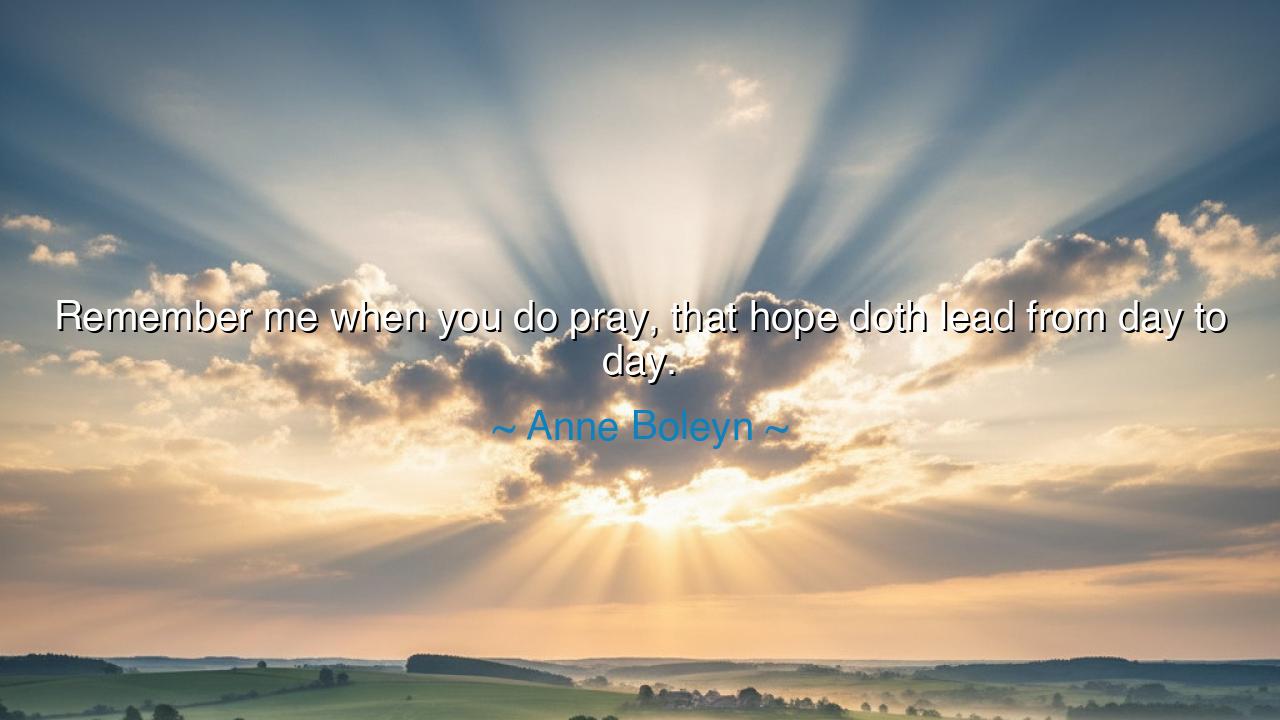
Remember me when you do pray, that hope doth lead from day to






The words of Anne Boleyn, “Remember me when you do pray, that hope doth lead from day to day,” echo across the centuries like the final whisper of a soul that refused to be broken. Uttered during her imprisonment before execution, they were not the words of a queen clinging to her crown, but of a woman clinging to faith, to hope, and to the eternal bond between souls that prayer alone can bridge. They reveal the quiet strength of one who had lost everything — her title, her freedom, her place in the world — yet still believed that hope could lead the heart forward, one day at a time. In them lies the very essence of the human spirit: frail, yet unyielding; sorrowful, yet luminous.
In this quote, Anne calls upon those she loved, and perhaps upon all humanity, to remember her in prayer — not as an idol or martyr, but as a fellow traveler in the valley of suffering. To “remember” in the ancient sense is not mere recollection; it is to hold someone in the light of one’s soul, to bind them through compassion and remembrance to the realm of the living. And in asking this, she reveals her faith that love and hope survive even the cruelty of kings and the finality of death. “Hope doth lead from day to day,” she says — and this is her creed: that even in the darkest prison, one can walk forward through time with hope as the lantern that keeps despair at bay.
To the ancients, this was a truth as sacred as it was practical. Hope was not seen as a weak or naïve emotion, but as one of the divine virtues, the companion of faith and love. The Stoics taught that the wise must prepare for adversity, but they too acknowledged the power of hope — that secret flame that allows man to endure what seems unbearable. Anne’s words rise from that same understanding. She had been stripped of worldly power, betrayed by those she trusted, condemned by her husband, King Henry VIII, and left alone to face death. Yet even in such despair, she turned her heart toward hope, asking not for pity, but for prayer — for connection, for remembrance, for the continuance of love beyond loss.
Her words, written in the shadow of her own mortality, remind us of another truth that runs through the history of the human soul: hope is not a luxury of the fortunate, but the strength of the condemned. Consider Nelson Mandela, who spent twenty-seven years in prison, stripped of liberty, isolated from the world. Like Anne, he too was sustained by a hope that “led him from day to day.” When asked later how he endured, he said simply, “I never lost hope.” For both these figures — the queen and the revolutionary — hope was not an abstract comfort, but a weapon of endurance. It was the thread that stitched meaning into each sunrise, even when tomorrow seemed only a rumor.
“Hope doth lead from day to day.” These words are not merely poetic — they are a philosophy of survival. They teach that life cannot always be conquered in grand gestures or sudden triumphs. Often it is lived — and redeemed — by the quiet persistence of hope, the unseen will to rise each morning and trust that the dawn still belongs to us. For the heart that hopes does not deny pain; it transforms it. Hope takes the ruins of one’s world and turns them into the soil where new beginnings can grow. Anne’s words carry that same unshakable faith — that even if she herself would not see the spring again, those who remembered her in prayer might carry her hope forward into their own lives.
The origin of this quote lies in Anne’s final days, when she composed verses and prayers from her cell in the Tower of London. They were the reflections of a woman once adored, now abandoned — yet her heart, even then, did not turn bitter. Instead, she wrote words that would endure long after her body was gone. Her legacy, thus, is not of scandal or ambition, as history often remembers her, but of the grace of a soul that believed in the eternal flame of hope. Where kings and empires sought to erase her, her words survived, carried by the timeless truth they expressed: that hope, though fragile, is indestructible.
So, my listener, take this teaching as your own: when sorrow comes — as it must — and the world turns its face from you, let hope lead you from day to day. Do not look too far ahead, for the road may seem endless; do not dwell too long on the past, for its gates are closed. Instead, walk faithfully with hope as your companion, letting each step be enough. And remember others, as Anne asked to be remembered, in your prayers — for in lifting others, you lift yourself.
For as Anne Boleyn, queen and prisoner, taught in her final wisdom: hope is the bridge between despair and faith, between death and eternity. And while all things of the world may pass, the prayer uttered in hope, and the hope whispered in prayer, endure beyond time itself.






AAdministratorAdministrator
Welcome, honored guests. Please leave a comment, we will respond soon